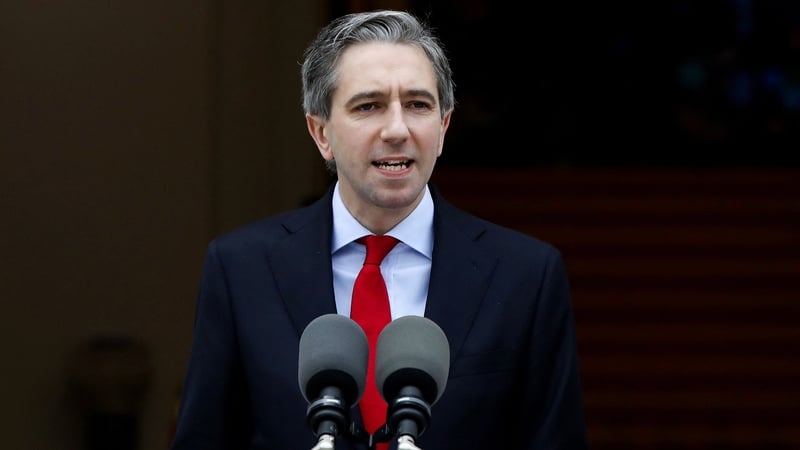Tánaiste Simon Harris has said it would be “inappropriate” for the United States to hit the pharmaceutical sector with tariffs while it was at the same time negotiating with the European Union on the trade relationship.
EU trade commissioner Maroš Šefčovič is due to hold meetings in Washington today with Trump administration officials following the US President’s decision last week to pause sweeping “reciprocal” tariffs for 90 days.
In an interview with RTÉ News, Mr Harris said: “It would be inappropriate if during that time, the United States was to take further action on a sectoral basis, including towards pharma.
“We’re either having good faith discussions or we’re not. And if we’re having good faith discussions, it means there should be a pause on any additional measures whilst those discussions take place,” he said.
The Tánaiste, who is attending a meeting of EU foreign ministers in Brussels, said he had made this suggestion to US Commerce Secretary Howard Lutnick when they met in Washington last week.
He said: “Usually, when you sit down to negotiate with people, you’ve got to do it in good faith, and you’ve got to do it to try and reach an agreement. It’s very hard to reach an agreement if, in parallel, new tariffs are being put on a very important economic sector for the European economy and for the Irish economy, which, of course, is the pharma sector.”

Mr Harris also said Ireland continued to have grave concerns about the EU-Mercosur trade agreement, which was concluded in principle last December but has yet to be ratified.
The European Commission President Ursula von der Leyen has been urging ratification by member states in the wake of Donald Trump’s global tariff war, as a way to position the EU as the pre-eminent defender of global free trade.
The incoming German chancellor Friedrich Merz is reported as saying last night that French President Emmanuel Macron was now “leaning” towards ratifying Mercosur, despite long standing French objections.
However, the Tánaiste said he had been assured by his French counterpart during a bilateral meeting in Luxembourg that France was still opposed to Mercosur.
“I got from him a strong sense that France still has very significant concerns around Mercosur, as does Ireland,” said Mr Harris.
He said the government still had specific concerns about Mercosur relating to farm incomes, and “the importance of a fair, level playing field in relation to [food] standards.”
However, the Tánaiste said he would be bringing forward proposals this month on Ireland ratifying the EU-Canada trade agreement known as CETA, which was concluded in 2016.
“I am planning on trying to advance other trade agreements and I intend to bring forward proposals in relation to Canada, in relation to CETA, hopefully this month, certainly within the next couple of weeks,” he said.
“We’re also standing ready to look at other opportunities that may come down the tracks, Singapore, Vietnam, Mexico, India, perhaps as well,” the Tánaiste added.
EU should ‘keep all options’ open over tariffs – McGrath
European Commissioner for Justice Michael McGrath has said that the EU needs to “keep all options on the table” in tariff negotiations with the US.
Asked about the EU potentially threatening to use digital taxes and anti-coercion measures against the US, he said that in any negotiation process “you need to enter into it from a position of strength”.
The Irish Government has been opposed to the use of both measures because of Ireland’s exposure to technology multinationals.
“The US will want to put items on the table but the EU will as well,” Mr McGrath said.
“Our perspective is that we will want an overall and comprehensive settlement that puts to bed all of the instability and uncertainty that has been caused by the imposition of tariffs and policy announcements over the past number of weeks.”
He said the recent uncertainty was leading to disruption in trade and “would ultimately cost businesses, it can put workers jobs at risk, it is not good for consumers either because it results in higher prices”.
He added that the EU was in the early stages of a 90-day process of negotiations with the US.
Mr McGrath was speaking in Cork’s Kent station for the opening of a new platform, one of three projects funded by the EU.
Read more: What is the EU’s trade ‘bazooka’ and what impact would it have?
Government should invest in supports for businesses – IFAC
Meanwhile, Irish Fiscal Advisory Council (IFAC) Chief Economist Eddie Casey has described as “strange” a signalling from Minister for Finance Paschal Donohoe that tax cuts in the Budget will not be firmly off the table.
Speaking on RTÉ’s Today with Claire Byrne, Mr Casey said the announcement goes back to the “age-old problem” that if the economy is doing well, the money created is used to support it even more, and if it is doing badly, then investment is pulled back.
Mr Casey said that the Government is right to invest in infrastructure and in supports for businesses that sell to the US to make them competitive.
There are three large US multinationals paying close to 40% of all the tax receipts which Ireland gets from its corporation tax, he said.
“If they suddenly start to lose profits because of the tariffs or if they decide to relocate or change how they operate, then there’s a big risk that Ireland suddenly sees a drop off in those tax receipts,” Mr Casey said.
Exit taxes would soften the knock-on effect of this, he said, and added that he does not think that companies will move in the near future under pressure from the Trump administration.
“I don’t think it’s going to happen that fast. I think probably what we’ll see, and we’re seeing some of this already, is a bit of a slowdown in new investment into the country,” said Mr Casey.
“We could see a slowdown in new jobs being created in Ireland until they get a sense that there’s a more certain level playing field here.”
Mr Casey added that what the Government can do is focus on areas which matter to multinationals and what make Ireland competitive.
“[Multinationals] have been warning about the lack of housing and how that impacts costs for them because they have to pay more wages to workers so that they can actually rent housing, and also things like energy and water, those are big areas that Ireland has really lagged other countries on.”




